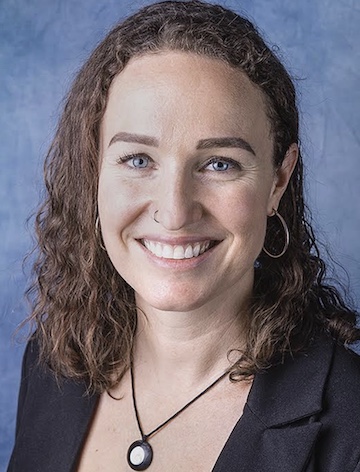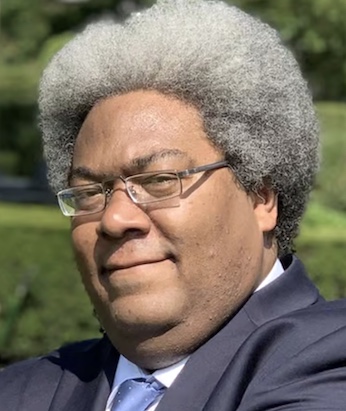author
Megan Phelps-Roper

On this date in 1986, former Westboro Baptist Church member Megan Phelps-Roper was born in Topeka, Kansas, the third of 11 children born to Shirley Phelps-Roper and Brent Roper. Her mother was one of 13 acknowledged children of Westboro founder Fred Phelps, a practicing attorney who founded the church in 1955 as a Primitive Baptist/Calvinist congregation. Most of the 100 or so congregants were also family members who lived in a compound in Topeka.
Shirley Phelps-Roper was spokesperson and coordinated picketing the church started in Kansas and around the country in the early 1990s. Its website with its notorious message of “God Hates Fags” was prominently displayed on signs along with other hate speech citing biblical authority. The website was still active as of this writing in 2024 and included over 20 scheduled protests that May and June, mostly at college and high school graduations.
“I picketed my own high school graduation before I walked in,” Megan said with a laugh to a Connecticut Jewish group in 2016, four years after she left the church. “We thought it was our duty to go and warn people of the consequences of their sins, and I understood that to be the definition of loving our neighbor. We would always say the sign doesn’t say anything about our personal hatred – it’s talking about the hatred of God.”
Westboro has celebrated AIDS, hunger, the Sept. 11 attacks and other tragedies, including the Sandy Hook school massacre. Westboro announced it would protest school memorials with signs saying “Pray For More Dead Kids.” Others: “Thank God For Dead Soldiers” and “Thank God For IEDs.” Megan celebrated on 9/11 and later said Westboro believed God was punishing America for embracing homosexuality: “Soldiers Die, God Laughs.” Westboro eventually also targeted Jews. (Daily Mail, Oct. 5, 2019)
She had held signs as a 5-year-old and as a budding teen argued online with Westboro detractors. She has admitted her upbringing was harsh, mentally and physically, but she still embraced church beliefs and its interpretations of the bible. “It was abusive – there’s no question in my mind it was. Gramp’s policy was to beat first, ask questions later.” (New York Times, Oct. 8, 2019)
Deaths of some famous persons were celebrated. Princess Diana and Mother Teresa died within a week of each other when Megan was 11. “And I, modeling what my grandfather had said, you know, I said, ‘Two whores in a week.’ ” (“Fresh Air With Terry Gross, Oct. 10, 2019)
While discipline was harsh and picketing was stressful, church members otherwise lived fairly normal lives, shrugging off being pelted by counter-protesters at times with eggs, tomatoes, urine and feces. Children attended public schools and education was a priority. Megan ran track in high school. “The Westboro students had a reputation for being diligent and polite in class, but at lunch they would picket the school, dodging food hurled at them by incensed classmates.” (The New Yorker, Nov. 15, 2015)
“My mom and her siblings and many of their spouses are attorneys. They’re very intelligent, and their arguments are well-crafted and tightly woven. And so they always had an answer. There was always a bible verse to justify [their extreme rhetoric].” (Ibid., “Fresh Air”) Megan graduated from Washburn University in Topeka and worked for her family’s law firm.
She started engaging with critics, including her future husband, on Twitter in 2009, which gradually made her consider opposing views. An older brother had cut ties with the church several years before, as had her uncle Nate Phelps and three of his siblings long before that. In 2012, she convinced her sister Grace, seven years younger, to leave the church with her during Grace’s sophomore year at Washburn. They ended up in Deadwood, S.D.
An internal power struggle had led to Fred Phelps’ loss of influence. He was later excommunicated and Shirley was also removed from her coordinator position. He died in 2014 at age 84. Megan’s younger brother Zach left the church later that year. It’s all detailed in sometimes chilling detail in her 2019 memoir “Unfollow.”
Six months after leaving Kansas, Megan went on a date with Chad Fjelland, who she’d engaged with on Twitter and is an attorney in eastern South Dakota. After marrying, they had a daughter, Sølvi Lynne, born in 2018, and a son, Tor Bjørn, born in 2022.
Megan started speaking at events which she had previously protested. She gave a TED Talk in 2017 about Westboro and her decision to leave. As a guest in May 2021 on FFRF’s “Freethought Matters” talk show, she said: “I’d spent more than two decades of my life on this earth, targeting people and antagonizing people, believing that it was the right thing to do, and believing that I was showing love to people in doing so. Suddenly, it felt impossible to come to terms with the harm that we had wrought.”
She was the recipient in 2021 of FFRF’s Henry H. Zumach Freedom From Religious Fundamentalism Award, which Nate Phelps had received the year before for taking a stand against religious intolerance and bigotry.
"I don't really believe in God anymore. I don't like to say I'm not a believer, because I'm a believer in a lot of things, primarily hope, and grace and the power of human connection. But God? No."
— KMBC News interview (Nov. 26, 2019)
Elie Mystal

On this date in 1978, Elie Mystal Jr. was born to Elizabeth and Elie Mystal Sr. His father was a Haitian immigrant who became the first African-American elected to the legislature in Suffolk County, N.Y.
Mystal Jr. moved to Indiana for his final year of high school after his parents’ separation in the 1990s. He earned a bachelor’s in political science and government from Harvard University in 2000 and a Harvard law degree in 2003. He started writing about politics and popular culture for City Hall News and the New York Press, the latter an alternative weekly published from 1988 to 2011.
After working as an associate for the New York-based international firm of Debevoise and Plimpton, Mystal quit practicing law in 2008 to become an editor and writer/blogger for the website Above the Law, where he wrote on topics related to politics, culture and the law. Above the Law once described him as an “online provocateur.”
Since 2018 he has been a correspondent for The Nation and his columns have also been published in the New York Daily News, New York Times and other outlets. He’s been a commentator on politically divergent forums such as MSNBC and Fox News.
Mystal met his future wife, Christine Nyereyegona, at Harvard. They married in 2004, the year she earned her law degree, and have two children.
In 2022 he published “Allow Me to Retort: A Black Guy’s Guide to the Constitution.” He commented later, “We act like this thing was etched in stone by the finger of God, when actually it was hotly contested and debated, scrawled out over a couple of weeks in the summer in Philadelphia in 1787, with a bunch of rich, white politicians making deals with each other.” (Salon, March 23, 2022)
He has been a guest on FFRF’s radio and TV talk shows and was the 2023 recipient of FFRF’s Clarence Darrow Award. Accepting the award, he said America is “devolving into a brutal theocracy … being led by the Supreme Court, which acts more like an unelected clergy than an impartial panel of judges.”
“The Supreme Court uses the Free Exercise Clause as a sword. They use it to force others who do not agree with the precepts of fundamentalist Christianity to live and work under its yoke, one bigoted baker at a time.”
— Mystal, speaking at FFRF's national convention in Madison, Wis. (Oct. 14, 2024)
